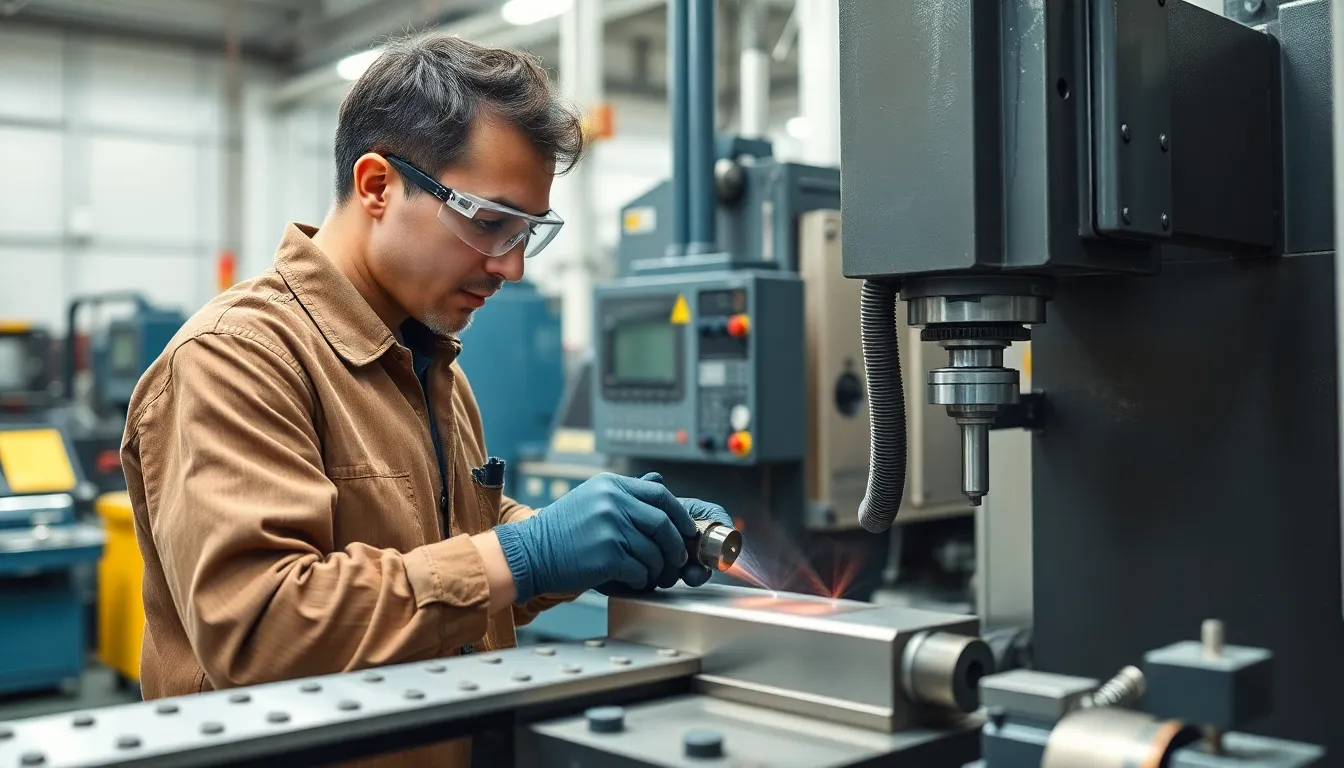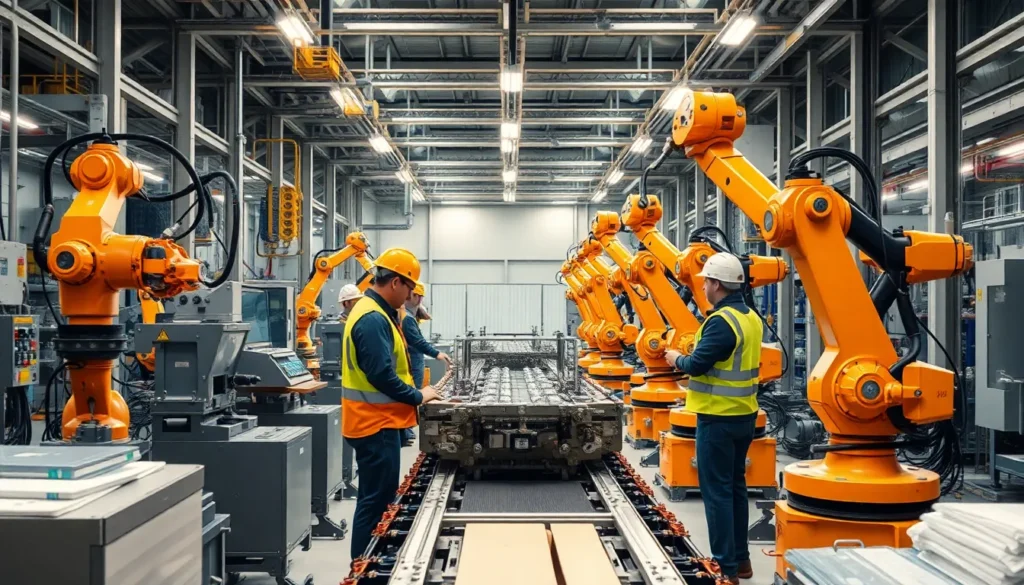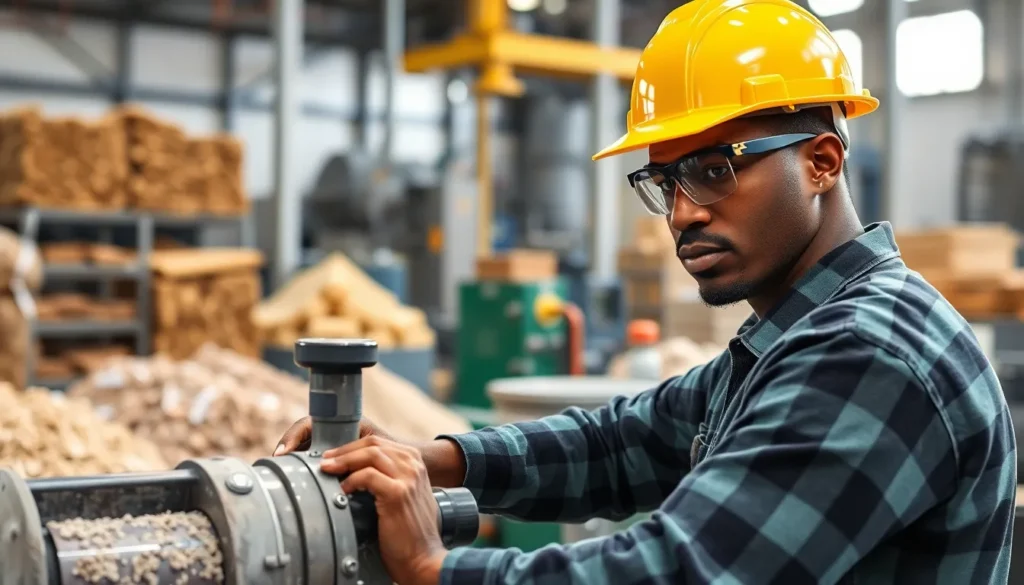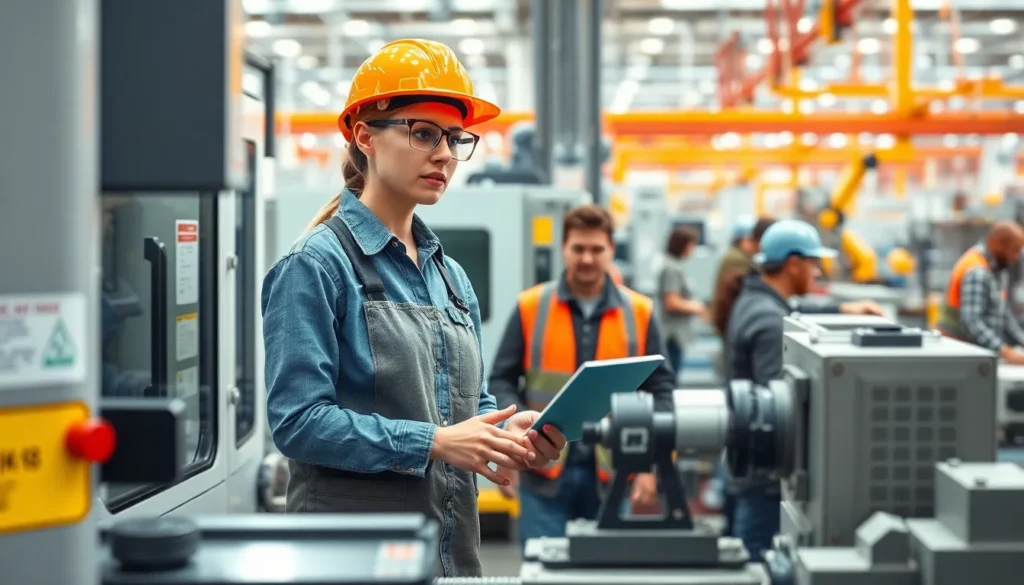In the world of industrial manufacturing, processes are the unsung heroes, quietly working behind the scenes to transform raw materials into the products that make life easier and more enjoyable. Picture a bustling factory where machines hum like a well-rehearsed orchestra, each part playing its role to perfection. It’s a dance of precision and efficiency, where the magic happens and innovation takes center stage.
From the moment a product idea sparks to the final assembly line, the manufacturing process is a thrilling journey filled with twists, turns, and maybe a few “oops” moments. Understanding this process not only demystifies how things are made but also highlights the creativity and engineering ingenuity that fuels the industry. So buckle up as we dive into the fascinating world of industrial manufacturing, where every widget has a story, and every assembly line is a testament to human ingenuity.
Industrial Manufacturing Process
The industrial manufacturing process encompasses various stages that convert raw materials into finished goods. Understanding its complexities reveals the significance of innovation and efficiency in production.
Definition and Importance
Industrial manufacturing refers to the systematic production of goods through the use of machines, labor, and methods. This process plays a vital role in the economy by creating jobs, enhancing productivity, and driving technological advancement. As industry demands evolve, manufacturers adapt processes to improve quality and reduce costs. Efficiency boosts output and minimizes waste, contributing to environmental sustainability. Each product generated supports economic growth and meets consumer needs, emphasizing the importance of optimizing manufacturing processes.
Key Components
Multiple components constitute the industrial manufacturing process. First, raw materials serve as the foundation for production. Then, processing techniques such as machining and assembly transform these materials into products. Quality control integrates inspection at various stages to ensure standards are met. Furthermore, technology plays a pivotal role, with automation and robotics enhancing precision and speed. Supply chain management coordinates the flow of resources, while skilled labor drives innovation and problem-solving. All components work together to facilitate seamless production, maximizing efficiency and product quality.
Types of Industrial Manufacturing Processes

Industrial manufacturing encompasses various processes that transform raw materials into finished products. Each method serves distinct applications, leveraging unique techniques and technologies.
Subtractive Manufacturing
Subtractive manufacturing involves removing material from a workpiece to achieve desired shapes and dimensions. Traditional machining methods such as milling, turning, and drilling fall under this category. Typically, the process begins with a solid block of material that undergoes precise cutting. This type of manufacturing offers high accuracy and a smooth finish, making it ideal for components requiring tight tolerances. Industries such as aerospace and automotive commonly use subtractive methods due to their reliability and ability to produce intricate designs.
Additive Manufacturing
Additive manufacturing, often known as 3D printing, builds objects layer by layer from digital models. This innovative process allows for the creation of complex geometries that traditional methods cannot easily achieve. Materials used can range from plastics to metals, increasing versatility in production. As demand for customization grows, additive manufacturing becomes essential, enabling rapid prototyping and reduced material waste. It finds applications in healthcare, aerospace, and consumer products, revolutionizing how manufacturers approach design and fabrication.
Forming Processes
Forming processes reshape materials without removing material, typically through techniques such as bending, forging, and extrusion. These methods involve applying force to metals and plastics, allowing them to flow into desired shapes. Forming processes are known for their efficiency, as they often require less energy than other manufacturing methods. Automotive and construction industries frequently utilize these techniques to produce components that showcase strength and durability. With advancements in technology, forming processes continue to evolve, enhancing the capabilities of manufacturers worldwide.
Technologies in Industrial Manufacturing
Technological advances play a pivotal role in modern industrial manufacturing. They enhance efficiency, productivity, and innovation throughout the production process.
Automation and Robotics
Automation streamlines manufacturing processes by minimizing human intervention. Robots perform repetitive tasks with precision, resulting in consistent quality. Moreover, robotic arms can work in challenging environments, from assembly lines to hazardous areas, improving safety for workers. Companies implementing automation experience reduced operational costs and accelerated production rates. For instance, automotive manufacturers leverage robotic systems for tasks like welding and painting, significantly enhancing throughput and accuracy.
Computer-Aided Design (CAD)
Computer-Aided Design allows engineers to create detailed 3D models of products before production. This technology facilitates rapid prototyping, enabling manufacturers to test designs virtually. As a result, revisions and optimizations occur early in the process, reducing material waste. Industries such as aerospace and consumer electronics utilize CAD for designing complex components, ensuring both functionality and aesthetics meet stringent standards. Additionally, CAD software allows for collaboration across teams, improving communication and project timelines.
Internet of Things (IoT)
Internet of Things integrates smart devices into manufacturing operations, enabling real-time data collection and analysis. Connected machines share performance metrics, allowing manufacturers to monitor operations and identify inefficiencies. This technology enhances predictive maintenance, meaning equipment can be serviced before failures occur, which minimizes downtime. Factories employing IoT experience increased operational visibility and improved decision-making capabilities. For example, IoT sensors can track inventory levels, optimizing supply chain management and reducing excess stock.
Challenges in Industrial Manufacturing
Industrial manufacturing faces several challenges that can impede efficiency and productivity.
Environmental Concerns
Environmental impact emerges as a significant challenge in manufacturing. Regulations require compliance with standards that limit emissions and waste. Adopting sustainable practices often leads to increased costs, particularly for small manufacturers. Clean technology investments can mitigate harmful effects but may not yield immediate financial benefits. Additionally, industries must balance ecological responsibility with production demands, striving to minimize carbon footprints while meeting output targets.
Supply Chain Issues
Supply chain disruptions present persistent challenges in industrial manufacturing. Global events, like natural disasters or political instability, often lead to material shortages and delays. Manufacturers depend heavily on timely delivery of raw materials, and interruptions can halt production lines. Alternatively, fluctuating prices of materials can strain budgets and planning. Effective communication with suppliers and investment in diverse sourcing strategies can enhance resilience against these disruptions.
Labor Shortages
Labor shortages significantly affect the manufacturing sector. Skilled labor remains in high demand, yet a shortage of qualified workers hampers production rates. Many companies struggle to fill critical positions, impacting operational efficiency and safety. Employer investment in training and education can help bridge the skills gap. Moreover, enhancing workplace conditions and offering competitive wages can attract talent to this vital industry.
Future Trends in Industrial Manufacturing
Industrial manufacturing is rapidly evolving, driven by various trends that enhance efficiency and sustainability. These trends shape the future of manufacturing as companies strive to adapt and thrive in a competitive landscape.
Sustainable Practices
Sustainable practices increasingly dominate industrial manufacturing. Companies aim to reduce waste and enhance energy efficiency. Use of renewable materials in production, alongside recycling initiatives, significantly lowers environmental impact. Implementing strategies like closed-loop systems promotes resource conservation. A focus on sustainability boosts brand reputation and opens new markets, attracting environmentally conscious consumers.
Advancements in AI and Machine Learning
AI and machine learning are transforming industrial manufacturing processes. Predictive analytics enhance decision-making by analyzing vast amounts of data. Automation solutions powered by AI optimize production schedules and resource allocation. Machine learning algorithms improve quality control by identifying defects during production. Overall, these technologies increase operational efficiency and reduce costs, driving competitive advantages.
Customization and Personalization
Customization and personalization are becoming pivotal in manufacturing. Demand for tailored products continues to rise, driven by consumer preferences. Adopting flexible manufacturing systems allows companies to respond quickly to these demands. Businesses leverage digital platforms to enable consumers to customize designs easily. Personalization enhances customer satisfaction and fosters brand loyalty, highlighting the importance of meeting unique consumer needs.
Conclusion
The industrial manufacturing process stands as a testament to human ingenuity and technological progress. By seamlessly integrating various components such as raw materials, skilled labor, and advanced technology, manufacturers create products that meet evolving market demands.
As industries face challenges like environmental concerns and labor shortages, the focus on sustainable practices and automation becomes increasingly vital. The future of manufacturing is set to be shaped by innovations in AI and machine learning that enhance efficiency and customization.
Appreciating the complexities of this process allows for a deeper understanding of its impact on the economy and society. Each product reflects a journey of creativity and precision that continues to evolve in the ever-changing landscape of industrial manufacturing.



